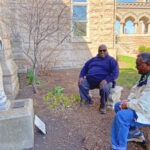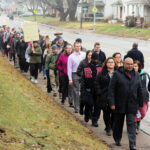
A movement is emerging in parishes, schools and clergy meetings in the Diocese of Davenport to learn how racism affects people of color in every aspect of their lives. It is imperative to keep the momentum going in Iowa (90.6 percent white) because some Iowans do not think racism is an issue that touches our lives.
“The Catholic Church needs to recognize that racism is present in our everyday life,” says Thomas Mason IV, a Black Catholic who leads the St. Martin de Porres Society at Sacred Heart Cathedral in Davenport. He says education is essential to helping all Catholics, across races, to learn about racism and to support interfaith dialogue to end it. The society he leads invites people throughout the diocese to become members who will help foster understanding of racial and cultural differences and through that effort to find unity. Contact Mason (thomasmason1928@gmail.com) to attend the April meeting, virtually or in person.
Consider joining a study group reflecting on the U.S. bishops’ pastoral letter against racism, “Open Wide Our Hearts: The Enduring Call to Love.” Check with your parish, Catholic school or other faith–based organization to see about joining a study on the bishops’ pastoral letter, or offer to organize one yourself. The materials are available on the U.S. Conference of Catholic Bishops’ website (usccb.org/resources/open-wide-our-hearts-study-guide).
Some priests and deacons in our diocese have talked about racism in their homilies and intercessions, knowing that not all parishioners are receptive to the message. Don’t let pushback end the discussion; messages from the pulpit can help change hearts.
Some schools in our diocese have taken the lead on raising students’ awareness about the contributions of Black civic and religious leaders in our country. Students at Prince of Peace Catholic School in Clinton studied prominent Black leaders and saints during Black History Month in February, a story we published to enlighten readers. Students at All Saints Catholic School and Assumption High School, both in Davenport, participated in St. Martin de Porres Black History Month essay contests. Watch for excerpts from their essays in future issues of The Catholic Messenger.
The discussions and the studies are challenging, particularly in communities where little diversity exists. Mason says we need to engage in tough conversation about race and injustice. It is OK to be afraid to discuss oppression and discrimination for fear of “getting it wrong” he said. “We learn about domestic violence by listening to survivors of domestic violence. The way to understand racial injustice is by listening to people of color.”
Invite people of color to share their stories in a gathering at the parish, in-person or virtual, as diocesan pandemic protocols permit. Watch documentaries and read books about people of color. Some suggested books to read (all available at www.amazon.com):
• “Racial Justice and the Catholic Church” by Bryan N. Massingale.
• “I Came as a Shadow: An Autobiography,” a memoir by the legendary Georgetown basketball coach John Thompson.
• “Caste, The Origins of Our Discontents (Oprah’s Book Club),” by Isabel Wilkerson.
Tyla Cole, a Black woman who previously served as the Diocese of Davenport’s archivist, says racism is not hard to notice because “hate crimes and white supremacists have been encouraged and anti-immigrant rhetoric intensified. Systemic racism is in our schools, workplace, court system, police departments, and elsewhere. Why? White people occupy most positions of decision-making power; people of color have a difficult time getting ahead.
Let alone things being fair.” How can we do a better job? “Believe that it’s real. Start a conversation and take action.”
Let us start with our Iowa legislators, who need to hear from us. A newly passed election law (Senate File 413), for example, will make it more difficult for some Iowans to vote. Organizations that represent people of color see this bill as a not so subtle sign of racism. “Given this country’s history of devising ways to deny the vote to African Americans and other people of color, it’s not rocket science to know these changes will have adverse impact on voters of color,” Betty Andrews, President of the Iowa-Nebraska NAACP, said in a March 8 statement.
Two other bills, House Files 802 and 228, also adversely affect our state’s ability to come to terms with racism. HF 802 prohibits effective diversity training for all state, county, city, public post-secondary education and public K-12 education. HF 228 would eliminate voluntary diversity plans under the state’s open enrollment law. Please oppose these bills.
We ought to pray and reflect on Scripture to prepare our hearts to learn about and work to end racism. “He made from one the whole human race to dwell on the entire surface of the earth, and he fixed the ordered seasons and the boundaries of their regions, so that people might seek God, even perhaps grope for him and find him, though indeed he is not far from any one of us” (Acts 17:26-27).
Barb Arland-Fye, Editor
Arland-fye@davenportdiocese.org











